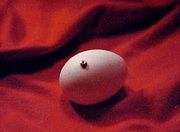Egg
From Plastic Tub
(Difference between revisions)
| Revision as of 03:25, 29 Apr 2005 Payne (Talk | contribs) ← Go to previous diff |
Revision as of 12:11, 6 May 2005 Payne (Talk | contribs) link Go to next diff → |
||
| Line 18: | Line 18: | ||
| </td> | </td> | ||
| <td width="180px" align="left" valign="top" bgcolor="#CCCCCC" style="margin: 0 0 1em 1em; background: #E0E0E0; border: 1px #aaa solid; border-collapse: collapse; font-size: 100%;"> | <td width="180px" align="left" valign="top" bgcolor="#CCCCCC" style="margin: 0 0 1em 1em; background: #E0E0E0; border: 1px #aaa solid; border-collapse: collapse; font-size: 100%;"> | ||
| - | [[Image:Egg.jpg|thumb|left|Eggs have only one natural enemy -- mouths.]] | + | [[Image:Egg.jpg|thumb|left|Eggs have only one natural enemy -- [[mouth]]s.]] |
| ==Desiderata == | ==Desiderata == | ||
| <font style="font-size: 92%"> | <font style="font-size: 92%"> | ||
Revision as of 12:11, 6 May 2005
egg n. 1. A single testicle. 2. Historically, one half of the ingredients necessary for the creation of a new human; a piece of generative equipment. 3. A storage facility for potential of any kind, in this sense a very small and discolored watermelon. 4. The eventual solidification of vapor, occurring over thousands of years and as such, highly valuable. 5. An ingredient for the manufacture of pancakes.
ExtrapolationContrary to much modern science, eggs were not invented by man but rather harnessed. As vessels of fecundity or veiled potentiality, the egg and the nut are closely related. The nut's protective casing -- masculine and hard -- distinguishes it from the fragile femininity of the delicate egg. See Also |
 Eggs have only one natural enemy -- mouths. Desiderata
Stimes Addisson called eggs "volcanoes in a jar." Eggs have been known to attack humans they see as weak or dissolute. An egg starred in several films by Johannas Desselsen.
|
